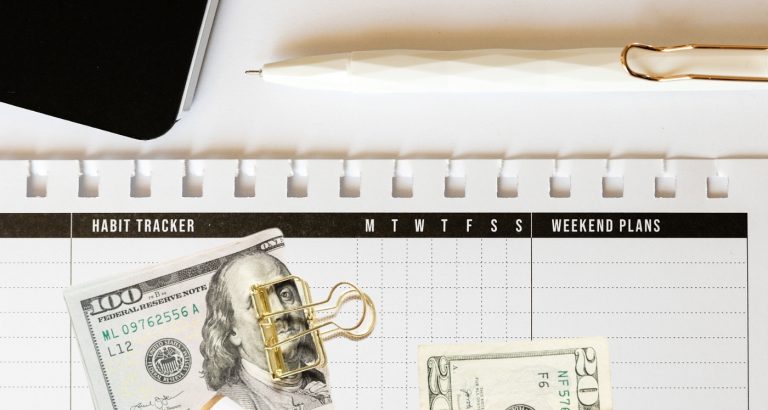10 Money Tips To Promote Good Money Saving Habits

How do develop good money saving habits? We have a few suggestions for you today.
When you aren’t used to saving money, it can be hard to start. The majority of Americans don’t save enough money in case of emergencies, are piled with debt and make payments on luxury items they really can’t afford.
As an affiliate partner of various brands and sponsored content, HerPaperRoute may earn commission on qualifying purchases. Disclaimer
But it doesn’t have to stay that way.
You can have peace of mind knowing you have money to fall back on. It doesn’t have to be hard to save money. It just takes persistence and getting a little creative.
It’s hard to break old habits and if you aren’t used to saving, it will take a while to get into it.
But don’t give up or get frustrated. You may have slip-ups or forget to save when given the chance, which is normal. Start where you are at and try again.
In addition to reading this post below about money saving habits, be sure to also read this post about money saving tips, where I reveal the 8 things I stopped buying, that saves e $19,642 a year!

Budget Planner
To help you develop good money saving habits, I’ve created a budget planning kit for you. Download it free of charge below!
10 Tips To Promote Good Money Saving Habits
Written by guest writer Stephanie from Chasing Your Passion
Start Small But Be Consistent
Starting small will get you into the habit of stashing away money.
It won’t break your budget but will still allow you to set something aside. This is one of the main things stopping people from saving.
They feel like the tiny amount they have isn’t enough to add up and make a big difference in their savings.
The point is that you start. Get into the habit, watch your money grow from consistently adding to it.
You will be amazed how much small contributions over time can grow, giving you security or getting you so much closer to an item you are saving for.
Consistency is important when you are saving small amounts. Over time you can work on putting more money into your savings but this tip is to just to get you going.
Work Towards A Savings Goal
It’s motivational to save money when you have a goal that you are aiming for. It makes you want to save more to get to that goal.
An emergency fund is the first thing everyone should set money aside for.
I would say at least six months worth of expenses in your savings, even though you always hear people say three.
The reason for six months is because if you or your partner lose their job or want to search for a better opportunity, this gives you more room to breathe.
Plus when something goes wrong that you need to dip into your emergency fund for, everything seems to go wrong before you have time to get that emergency fund back up again.
After having your emergency fund in place, set new goals to work toward.
It’s great to have a few different ones at the same time, putting the most money into the one you want to accomplish first and dividing the rest of the money between your remaining goals.
Figure out how much money you want to save in each goal and set an achievable date to get it done by.
So if you want to save money for a trip to Disneyland that you want to take in three months, how much money would you have to set aside out of every paycheck?
Is that number realistically possible for you to save?
Physically seeing your money add up for each goal will encourage you to keep going, as long as you don’t start spending it just because it’s convenient.
Automate A Certain Amount / Percent Into Savings
For some people, it’s easier to automate their savings so that they don’t spend it.
This will make it seem like your income is less, therefore making you work on a tighter budget while your money is growing in a separate account.
Once you set it, it takes little effort from you!
There are two ways you can set up an automation for your savings:
Direct Deposit From Work – You can split your paycheck up right away between your checking account and your savings account through your work (if your job offers direct deposit).
Direct Deposit From Your Checking To Your Savings – You can set a date that you want money automatically transferred from your checking account into your saving account.
This is the way to go if your job doesn’t offer direct deposit and you have to go to the ATM to deposit your money.
Start small with your contribution in the beginning and slowly raise it. Slowly raising your savings amount will allow you to go over your budget and see what else you can possibly cut back on.
This can go into your savings account.
And as your savings is growing, it will motivate you to put more into it.
Budget Your Savings
Budgeting your savings is another option if you don’t like the idea of automating your money into a separate account.
So along with your normal bills, you would add a category for savings.
It is vital to write it down in your budget. Instead of relying on yourself remembering to do it, see how much you have left and think there is a bit of money that you can spend.
It’s important to make your savings a priority that is written down in your budget.
Count it as another expense that you need to transfer to your savings account.
It’s essential that you stash money away in your savings account before planning your trips out with friends or blowing through the money you have, thinking you will save what’s left.
You owe it to yourself to live an amazing life. That means having security from saving six months expenses for a rainy day and working hard to get more out of life.
Whether you save before any bills come out or decide to save after paying the expenses, that’s your preference.
But one way or another, save before you decide to go out or start planning other things to use that money for!
Plan Non-Spending Days
A no – spend day is perfect for everyone! You don’t need to spend money in order to have a good time.
Even if you go to the mall with friends, leave most of your cash (and yes, the credit cards!) at home, only carrying enough for a drink and some food.
There are a ton of free or cheap activities to do, walking at the park, local festivals around your area, or staying in and watching a movie.
Once you have successfully spent a whole day without spending any money, transfer that money into your savings. Then take a few minutes to think about this saving method.
Were the free activities just as much fun as the expensive ones?
How did it feel to set that money into your saving goals instead of splurging?
Could you plan regular hangouts or family time around free things to do in order to save more money?
[adsense]Save On Everyday Items You Buy
Just like the non-spending days, for every amount you save on groceries or everyday items, put that amount into your savings! You would have spent it anyway.
Here are a few ideas to get you started on saving!
- Coupons (as long as they are for items you would have bought regardless)
- Ibotta
- SavingStar
- Ebates
- Taking advantage of sales (especially non-perishable items)
It may not seem like that .50 coupon or buy one get one deal is worth it but if it’s on an item you were already planning on purchasing, save your hard earned money for more important goals!
If you went to the store once a week and were able to save $10 off of your total every week, that’s $520 a year you would save. Make it a game to see how much you can save.
Automate At Least 10% Into Your Retirement Account
This is a must that people ignore or postpone until years down the road when they really start to worry about it.
Anytime retirement is brought up, people always tell me they don’t know the percent they are contributing or if they are at all.
They see what their paycheck is and that’s all that matters.
There are several reasons people give for why they don’t contribute as much as they should into their retirement early on.
“I have 3% going into my retirement. Isn’t that enough after 40 years of contributing?”
The truth is, we need to contribute at least 10% into a retirement account. If your employer matches, find out how much their percent is that they will add on top of your contribution.
It’s effectively free money that will compound even more over time. So for example, let’s say your employer will match 25% of what you put in (up to a certain amount), that means they will add a quarter for every dollar you put in. Doesn’t seem like much until you do the math.
$120 (that you are putting in bi-weekly) X .25 = $30 from your employer every two weeks
Over the course of a year, that’s $780 of free money your employer put into your retirement account!
“I’m still young so down the road I will start to contribute”
This mindset of putting off your savings because you think you have time is exactly what will cause you to not have enough in your retirement when it comes time.
The sooner you start stashing money away for your retirement years, the more your money is able to work for you with compound interest.
Compound Interest – Interest paid on both the principle amount (the amount you contributed) and the previous interest already paid.
It will make a bigger difference if you start sooner, only contributing for 20 years compared to someone else contributing the same amount but for years longer.
The sooner compound interest works for you, the better off your retirement will be.
“I already live paycheck to paycheck”
I think this is a huge problem to address because so many households have this issue so they don’t put much, if anything, into retirement. But let’s stop for a minute and consider what we want out of our future.
What age do you want to retire?
More people are retiring at a later age so that they can have more money but with a shorter retirement time. If you are in good health to do this, by all means!
But you still should be prepared in case you change your mind or it becomes harder for you to work.
Related: How To Start A Blog That MAKES Money
What kind of lifestyle do you want to have once you hit the age to retire?
Things to consider here are whether you plan on renting or having your mortgage paid off completely before retirement.
Do you want to take trips whenever you feel like it? Or just be laid back and enjoy small hobbies to keep you busy? Will you have a part time job to supplement your income or even to stay busy?
If you end up with health issues in your later years, your retirement is something you may need if you can’t work.
Look into your family’s health history to see what you may have to deal with down the road and at what age it became an issue for your family.
Putting your retirement off will cause financial problems when you are older.
You won’t be able to retire or live the life you truly want because of your paycheck now. Find ways to cut back your budget in order to put more into your retirement.
Live below your means and if you think you already cut your budget as far as you can, remember there are other ways to supplement your income if need be.
Do side jobs, take on a few hours of babysitting, or find cheaper (but just as good) alternatives to brands you buy.
There are two different ways to contribute into your retirement – Pre tax or after tax.
Pre-tax means that you will have more to grow your money because it will be with your gross income.
But you will have taxes taken out of all of the money when you retire. If you choose to go with this option, keep in mind that it is before taxes.
So 10% is going to give you a larger amount deposited since it is pre-tax.
The actual difference in your take home pay is smaller.
After tax means that you may be contributing less into your retirement, which means less compounded, but you won’t have to pay as much in taxes when you retire.
Act Like You Didn’t Receive Extra Money
Extra money could be anything from getting a raise or promotion, working more hours on top of your normal hours / overtime, or receiving a bonus from work.
If your work doesn’t provide a bonus or is slow right now, you could always do a few side jobs to come up with the extra money.
You have already been able to handle your finances and bills with the money you were bringing home. So once you start making more, stash it away!
Since you weren’t used to having it to begin with, you won’t notice it “missing” from your check as you put it away for your savings goals.
What ends up happening with most budgets is that along with more money, there is more expenses that get added on also, leaving people in their paycheck to paycheck cycle.
What choices would you make if you had extra money that would benefit you and your family long term?
Related: How I Make $12,000 per month as a stay-at-home blogger
Visual Reminders
Visual reminders will help you always keep your goals at the front of your mind. If you are always thinking of what you are working hard for, you will be motivated to keep going.
It’s good to have a visual reminder not only at home, but in your car and at your job also.
Anywhere you spend a majority of your time. You may not have thought about your car but if you are trying to cut back on eating out or going shopping, this is the perfect place to put a reminder.
A few ideas for visual reminders:
- Vision board on your wall
- A picture of what you are saving for as your phone background
- A chart showing your progress saving
- Motivational quotes where you will see them most
Whatever will motivate you every time you see it is a great visual reminder. Create as many as possible.
Apps That Round Up Your Purchase
This is another tip that will require no extra effort from you once you have it set up.
Once the app is set up, every time you make a purchase with the card you put into the app, it will round up the number you just spent to the nearest dollar.
The payment difference will then be transferred into your savings account.
So if you spent $39.20 at the store, it will round up your purchase to $40 and automatically deposit the .80 into your savings.
I had first heard about this with Bank Of America’s Keep The Change Program. You had to have their specific card to do this but the idea is perfect for saving!
There are now quite a few apps out there that you can download on your phone no matter where you bank at. A few I’ve heard of (but need to look into myself) that seem popular are:
Acorns – Invest Spare Change
Invest spare change automatically into more than 7,000 stocks and bonds! Then sit back, stick with it and watch it grow over time.
With Acorns, it’s easy, fast and secure to invest and save regularly in the background of life. Join over 3,000,000 people already investing their spare change with Acorns.
Qapital – Saving & Checking
Qapital is an easy-to-use banking app that allows you to manage your spending and save automatically. Get started today and save $1,400* in a year without any effort!
CoinOut – Your Digital Wallet
Get paid to shop normally… at ANY RETAILER! Upload any receipt in the app and earn cash back. You don’t have to find specific deals or take time to see if a certain retailer is on the program. Just snap and earn
Money Saving Tips Made Easy
As you can see, there are a ton of different methods to help you get into the habit of saving.
Not all of these will work for everyone, so try a couple of them out to see if they work for you.
Bad money habits are hard to break but keep trying and you will be so happy in the long run.
It’s easy to get caught up in the day to day activities and postpone working on our savings goals.
But it’s very crucial in order for us to feel financially secure.
It is also important to help us avoid payments (and interest) on those big-ticket items. Start today, no matter how small, and be on your way to being financially independent.
Stephanie started chasingyourpassion.com to help people get the life they have always dreamed about. She writes about finances, working toward your goals and going after your dreams.

Follow along on Instagram!












